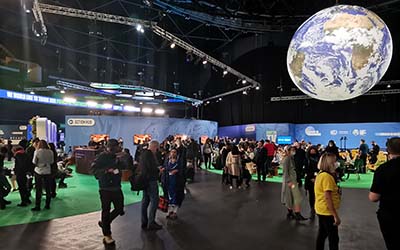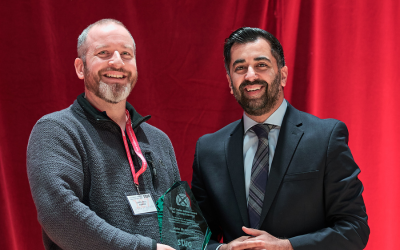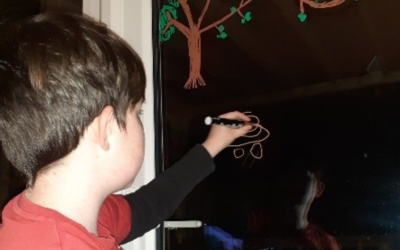COP26 - an Observer's perspective
 Author:
Author:
Graeme Smith is a Team Manager in Student Recruitment and Support at the OU in Scotland.
The Open University in Scotland is leading work to build public knowledge about sustainability. This includes influencing and informing public opinion and mobilising people to coalesce and act around arguably the biggest societal challenge of our time.
With official observer status at the United Nations Climate Change Conference COP26 in Glasgow, we are learning from the conference to inform the university’s wider sustainability mission and inspire students and staff to take action. Here Graeme Smith talks about his personal experience as a COP26 Observer and his compelling takeaways.
Attending COP26 as an observer was a whirlwind experience from the beginning.
 The mass of events, zones, meeting rooms, pavilions, thoroughfares plus more took a couple of days to get used to.
The mass of events, zones, meeting rooms, pavilions, thoroughfares plus more took a couple of days to get used to.
The sheer scale of everything including some of the nations’ pavilions - where countries, Non Governmental Organisations (NGOs) and businesses showcased initiatives and highlighted climate-based issues they face – made it easy at first to forget why we were actually here.
Although you got used to it quickly, the constant swirl of people in suits shouting into phones about amendments and deadlines was exciting.
Something else to watch out for was the confident charge of security guards through the crowd – a sure sign a high-ranking politician or celebrity was following behind.
I could discuss a thousand things I learned / saw / heard but will focus on just a couple of takeaways. One of the most thought-provoking events I saw was a Future Labs event: Climate-Smart Healthcare for a Healthier Planet.
 This was an excellent session with a wide-ranging and diverse array of guests, including big-hitting speakers from the NHS, Medicine sans Frontiere and Providence Healthcare (US), as well as some personal testimony from an Egyptian doctor, an anaesthetist from London, a senator from Chile and more.
This was an excellent session with a wide-ranging and diverse array of guests, including big-hitting speakers from the NHS, Medicine sans Frontiere and Providence Healthcare (US), as well as some personal testimony from an Egyptian doctor, an anaesthetist from London, a senator from Chile and more.
But the most heart-breaking speech was from Rosamund Kissi-Debrah, an activist whose nine-year-old daughter’s death was the first in the UK to have air pollution as an official cause of death on her death certificate.
The overriding theme of the event was how health is often overlooked when the perils of climate change are discussed.
Sure, there is general awareness that air pollution is bad and that we need to reduce emissions, but are the public aware it is linked to seven million deaths globally each year?
Considering the world’s response to Covid - in which trillions of dollars were mobilised as soon as the economy and health of the masses were at risk - why is this not happening with climate change-induced health issues?
%20-%20cropped%20-%20blog.jpg) There is an argument that focussing on how detrimental the climate crisis is to our health is a way to further reach the masses: would they be more on board (in terms of behaviour change and putting pressure on industries and governments) if the dangers to their children’s health were at the front of the campaign for people to change behaviour?
There is an argument that focussing on how detrimental the climate crisis is to our health is a way to further reach the masses: would they be more on board (in terms of behaviour change and putting pressure on industries and governments) if the dangers to their children’s health were at the front of the campaign for people to change behaviour?
This leads on to another related point which was brought up in several sessions: people in poverty will be the worst affected by climate change but have the least capacity to campaign against and fight it.
This, of course, makes complete sense. If your daily life is about survival and you live in poverty, the intangibility of climate change and its effects are not of importance.
The challenge for society is how we can frame these issues so they do take on importance to everybody. Universities have a role here and it starts with role-modelling – so far over 1,000 higher education institutions have joined the Race to Zero net emissions.
At the OU, we have committed to divestment from fossil fuels by 2023, decarbonising our energy supplies by 2030, and being ‘net zero’ by 2050.
%20-%20cropped%20-%20blog.jpg) And finally, although there are delegates from almost every country in the world, the conference is heavily-weighted towards those in the global north.
And finally, although there are delegates from almost every country in the world, the conference is heavily-weighted towards those in the global north.
If you don’t speak English, the conference must be very difficult to integrate with. Since 2014 only one COP has been outside of Europe and that was in Marrakech, which is only 400 miles from Europe.
There is a real desire from some to affect economic and systemic change. Whether this is reflected within the governments and investors remains to be seen.
Find out more about climate change and COP26 on our OpenLearn hub.
News
Media contacts
Media enquiries
OU in Scotland Media Relations:
Call 0131 549 7932
OU UK Press Office:
Call 01908 654316
Out-of-hours:
07901 515 891
Visit our OU UK news site

